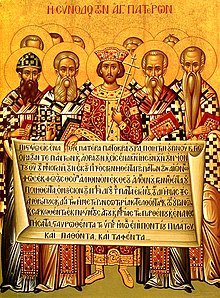
Back Psilantropismo Spanish Psilantropisma Malagasy Psilantropism Romanian Псилантропизм Russian Mohimi i lindjes së virgjër të Jezusit Albanian Psilantropism Swedish Псилантропізм Ukrainian

Denial of the virgin birth of Jesus is found among various groups and individuals throughout the history of Christianity. These groups and individuals often took an approach to Christology that understands Jesus to be human, the literal son of human parents.[2][3]
In the 19th century, the view was sometimes called psilanthropism, a term that derives from the combination of the Greek ψιλός (psilós), "plain", "mere" or "bare", and ἄνθρωπος (ánthrōpos) "human". Psilanthropists then generally denied both the virgin birth of Jesus and his divinity. Denial of the virgin birth is distinct from adoptionism and may or may not be present in beliefs described as adoptionist.
- ^ Marthaler, Berard L. (2007). The Creed: the apostolic faith in contemporary theology. 3rd ed. ISBN 0-89622-537-2 page 129
- ^ The Westminster handbook to patristic theology by John Anthony McGuckin 2004 ISBN 0-664-22396-6 page 286
- ^ Thinking of Christ: proclamation, explanation, meaning by Tatha Wiley 2003 ISBN 0-8264-1530-X page 257